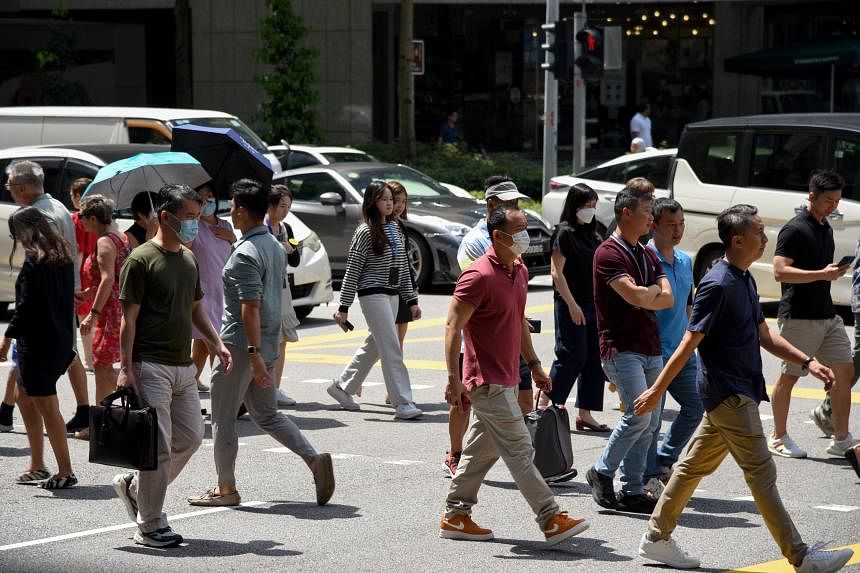SINGAPORE – After 10 years of not working due to mental health conditions, 53-year-old Camila (not her real name) was keen to enter the workforce.
With help from job coaches at the Singapore Association for Mental Health (SAMH), she was matched in 2021 with a local packaging supplier that was open to hiring those from vulnerable groups.
Starting work was tough and she had trouble opening up to colleagues, but strong support from her supervisors who were briefed about her condition helped Camila find her footing. Now, two years in, she has grown more confident and improved her social skills while maintaining an income for herself.
In 2023, 409 job seekers from vulnerable groups – such as rough sleepers who experience homelessness and sleep in public places or temporary shelters, and people with mental health conditions like Camila – received dedicated job coaching. Among these people, 81 per cent or 333 successfully gained employment.
This was done through a partnership formed in 2022 between SBF Foundation, Singapore Human Resources Institute, National Trades Union Congress’ Employment and Employability Institute and Tote Board. SBF Foundation is the social impact arm of the Singapore Business Federation.
More than 50 per cent of the job seekers supported were rough sleepers and lower-income individuals, while around 40 per cent were women facing challenges like single parenthood.
For 55-year-old Alan (not his real name), securing employment was a struggle due to health issues after a heart operation. He was unemployed for two years.
In 2021, he could not continue his housing lease due to financial struggles, and lost his rental room. He stayed in different shelters for about a year, and sought housing at the New Hope Community Services (New Hope CS) shelter in March 2022.
Staff at New Hope CS connected Alan to local farming business Urban Culture, which was open to recruitment.
The company offered him a role as a delivery driver, and was able to accommodate his needs such as frequent medical leave and weekly reimbursement to help with his tight cash flow.
Alan, who has since gained financial stability, said he is happy working there as they trust him and treat staff fairly.
New Hope CS is one of the social service agencies supported by SBF Foundation to run a job support and retention programme for displaced individuals and those living in transitional shelters.
Job coaches from the programme help vulnerable individuals in their employment journey through training or upskilling, and looking for suitable job placements from employers.
New Hope CS career coach Andrew Ong said coaches continue to work with the beneficiaries and their employers after they are hired to address any work adjustment issues.
He said: “This whole process of journeying with the beneficiaries can take anywhere from a few weeks to even a few years, as our career coaches are still in touch with some beneficiaries to check on their well-being.”
Job coaches also work with other parties like social workers to ensure the individual is supported in other ways, such as helping them seek more permanent housing arrangements to enable them to sustain employment.
Coaches also keep up with agencies for updates on the job market, and engage employers to encourage the hiring of vulnerable individuals.
Addressing stigma
SAMH said employers are still hesitant about recruiting vulnerable job seekers due to a lack of understanding, which often leads to stigma.
New Hope CS said some perceptions that cause employers to be hesitant to hire a vulnerable person include high absenteeism, low job commitment, and poor work attitude like lack of initiative.
“We recognise that although some individuals from vulnerable groups may potentially display some of these challenges above, there are also others who are willing to seek employment and do their best.”
A spokesman for SBF Foundation said that linking up and working with hiring organisations is a critical factor besides having job coaches to support vulnerable individuals to be job-ready.
He said: “Having the knowledge about the challenges faced by the vulnerable individuals trying to gain access and what are the supportive factors to aid employment will enable the businesses to contribute through offering job opportunities, and enhancing hiring practices.”
Some examples of barriers faced by vulnerable individuals include caregiving responsibilities, lack of confidence, outdated skills and unstable dwelling.
SAMH reaches out to employers in the food and beverage and retail administrative sectors to discuss potential job opportunities for its clients.
Coaches from New Hope CS look for suitable employers by reaching out to companies through word of mouth, online job portals and job fairs. Some employers contact New Hope CS directly through its website to explore potential partnerships.
SBF Foundation said engagement sessions are held with human resources professionals, employers, and social service agencies to share best practices on progressive hiring practices to fulfil manpower needs and support the employability of vulnerable people.
More than 220 new employers were engaged in the last three years, with about 160 of them hiring vulnerable individuals.
New Hope CS said the engagement sessions aim for everyone to share their experiences, both struggles and opportunities, in hiring and working alongside those from the disadvantaged community.
“Some were able to identify and share the changes needed to solve various issues at hand, while others got the chance to learn and acquire new tips and best practices.”
New Hope CS said: “Our hope is that an increasing number of employers will be open to hiring people from vulnerable groups. This will help alleviate manpower shortages in certain labour-intensive industries in Singapore that struggle with automation.
“Employment will also help dignify lives and boost the self-esteem and income of vulnerable groups in Singapore.”


